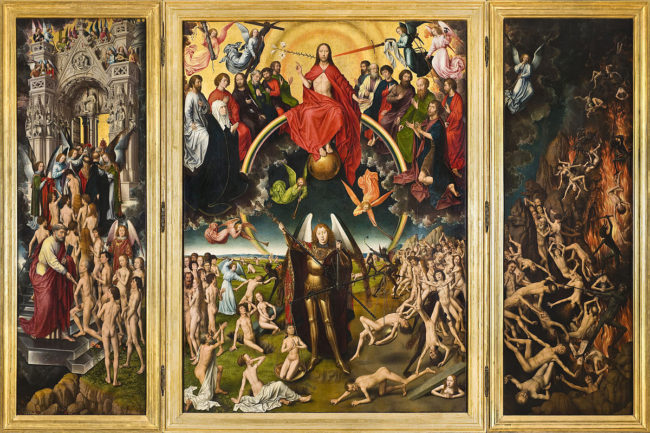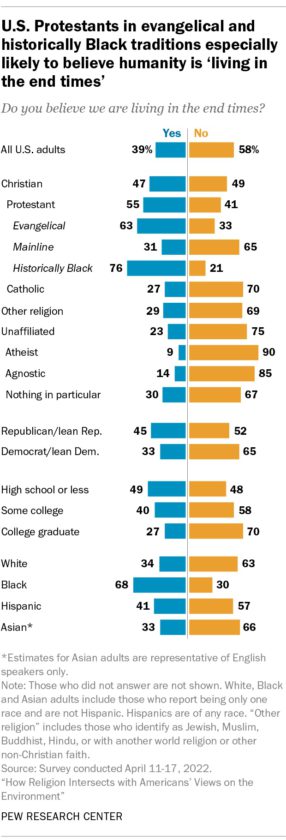
Since the very beginning of Christianity the idea that we are in the last days has been a persistent belief. To illustrate this reality, Wikipedia has an ever growing and most probably incomplete list of dates that were predicted to be the final day.
A more recent and rather famous example were the predictions made by Harold Camping. He initially predicted the Judgment Day would occur on or about September 6, 1994. When that came and went with nothing happening, he opted for subsequent dates. The most famous he promoted was May 21, 2011. That one is well-known and went viral because of the vigorous and well-funded advertising campaign that surrounded it.
After May 21 the media were fascinated to see how Camping and all those that had believed it all responded. Camping himself played the age old card of “It happened, but only on a spiritual level”. He qualified that with a claim that the physical would manifest on Oct 21. Rather obviously, as we all now know, nothing happened. About a year later in 2012 he finally admitted that he had been wrong and did not actually know.
What does persist and continue from the very beginning of Christianity is the assertion that we are in the last days. Over almost 2,000 years somebody has been promoting the claim and many still believe it.
How many today currently believe that we are in the end times?
We don’t need to guess, because Pew recently ran a poll and so we do have an actual measurement.
Pew Insights
They published their results on Dec 8 2022, so this is a recent poll. Here is what they have …

There are a few surprises in there.
Things you would anticipate are the large numbers of Christians embracing this rather popular mythology.
However, what the heck is going on with these numbers …
- 9% of Atheists, 14% of Agnostics, and a whopping 30% of Nones thinks we are in the end-times.
If you think that is strange then read on because it gets even weirder.
They also asked “Do you believe that Jesus will return to earth someday?“.
More surprises.
- 6% of Evangelicals, and 20% of Christians overall … said “Nope”
- 1% of Atheists, 8% of Agnostics, and a whopping 29% of Nones … said “Yes”.
So in essence we have this. There are folks who sincerely believe Jesus is indeed the messiah and their personal saviour, but don’t believe his words in the bible where he says he will be coming back.
Then there are folks who reject religious beliefs and the associated claims, yet they happily state that they do believe that they guy they don’t apparently believe in will be coming back.
What is going on here?
I can perhaps speculate a bit
What is true is that there are people who will embrace the identify “evangelical”, but don’t attend any church and don’t actually believe at all. Instead it is a political identity. They see others within their tribe use that label, so they align with that and do the same.
As for Agnostics, well that is an identity label where people sit on the fence a bit, so I would anticipate them going with “perhaps”, and that gets morphed into a “yes”.
Nones are often people who have rejected mainstream organised religion, but might indeed still consider themselves “spiritual”, hence may have indeed be tempted to swing towards a “yes”. That’s just a guess.
As for the 1% of atheists who don’t believe Jesus is real, but still think he is coming back … nope, I honestly have no idea what is going on there. Trolling perhaps, or did not understand what was being asked at some point?
What also becomes rather clear is that as Pew drill doing into the topic using further questions to understand what people believe, the rather unsurprising “revelation” is that there is no consensus, no common understanding at all regarding interpreting the bible and plucking out an end-times understanding.
That insight is to be expected. Over the years a vast diversity of quite distinctly different beliefs have been built up and so we have a Wikipedia article describing it that runs to many pages and cross references many other more detailed pages.
We do truly love making stuff up and then sincerely believing it.
Why are we prone to embracing such beliefs?
So what is going on here, why does the “End Times right now” belief gain traction and persist century after century, despite the very long history of failed predictions.
Generally what is going on is that humans tend to lean towards answers that explain events that are totally beyond their control. Embracing such ideas meets a psychological need to gain control. Random catastrophic events causes deep emotional anxiety.
We have just been through a period in which over one million US citizens died. There are tragic stories of those that denied it all, rejected it as a hoax, and avoided sensible public health measures, then ended up in hospital begging for a vaccine, only to be told it was too late. Many of them did not make it. For those around them this was deeply traumatic.
The embrace of ideas such as conspiracy claims and also end-times beliefs creates an explanation that helps to relieve the stress and anxiety.
Study: “Covid-19 and the Apocalypse: Religious and Secular Perspectives“
Here are a few quotes from that paper …
…Fundamentalist Christians, especially those who hold to the rapture, assert that the Book of Revelation forecasted the pandemic 2000 years ago. Throughout the course Christian history, apocalyptic expectations that the world will imminently end have waxed and waned. The idea that history is moving inexorably to a catastrophic end is a longstanding one in the West. The millennial years, 1000 and 2000 were associated with heightened apocalyptic expectations. Catastrophic events, such as the Black Death in 1348 or the Cuban Missile Crisis in 1962, regularly bring about panic and the expectation that doomsday is imminent…
The essence of what is happening is this – when a painful experience, such as an electric shock, is predictable, we relax. The anxiety and concern created by not knowing is removed. “Knowing” that we are in the end-times creates an answer and so people who embrace that as the reason for what is happening stop worrying.
Instead there is a focus on preparing for the end. This also greatly helps. Having specific goals to focus on really does help in times of trouble.
The mechanism in play that make some prone to the embrace of end-times thinking is in many ways related to the mechanism that also makes some people prone to the embrace of conspiracy beliefs. Those that study either of these have often observed a considerable overlap between both.
Something dramatic happens, for example 9/11. When faced with an almost random and totally devastating event that had a deep emotional impact some respond by grasping for meaning. Deep feelings of powerlessness and anxiety are relieved via the embrace of a conspiracy claim, and so we have the 9/11 truth movement. Those within feel they have an insight, a secret knowledge, and have grasped hold of it as a means to cope.
Bottom line – the root cause of both end-times beliefs and also conspiracy beliefs is that it is a mechanism some people embrace to cope with deep uncertainty and fear.
Final Thought: Remember The Mayan Calendar
You might perhaps recall all the fuss regarding the end of the Mayan calendar being the supposedly last day and that something dramatic was going to then happen. That date was supposedly Dec 21, 2012.
The idea was this – it was the very last day of a 5,126-year-long cycle in the Mesoamerican Long Count calendar. The domesday stuff was of course a modern claim. There were no Mayan accounts that predicted it was the last day.
The actual solution was rather simple. On 31 Dec this year our own 2022 calendar comes to an end and goes no further. The Mayens, like us simply start a new cycle.
In other words when your current calendar ends, just go buy a new one, because despite the almost countless number of end-date predictions, life just gives it all the finger and proceeds to carry on utterly oblivious to our beliefs.
Some might indeed find comfort, but if embracing the things that are actually true is important to you, then your very best defence is doubt and skepticism when faced with such claims.
Past experience is a good indicator of what will happen. Every single end date ever predicted, and there have been an almost countless number of them, has failed. On that basis both you are I can safely predict two things with a high degree of certainty …
- There will be many more end-dates predicted in the years to come
- Each and every single one of them will be wrong.